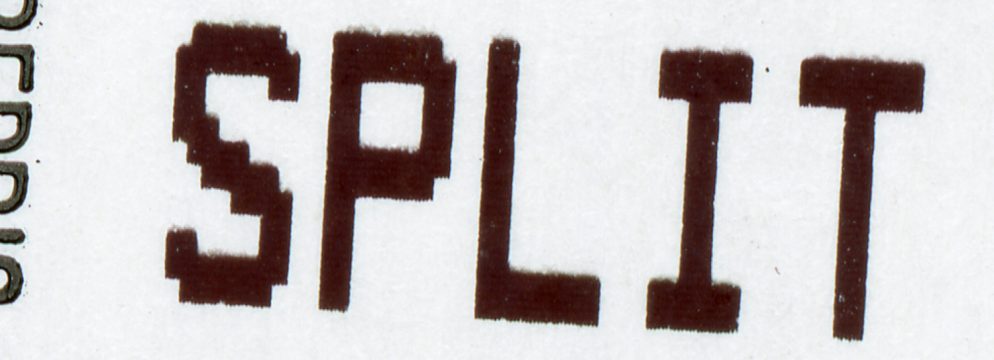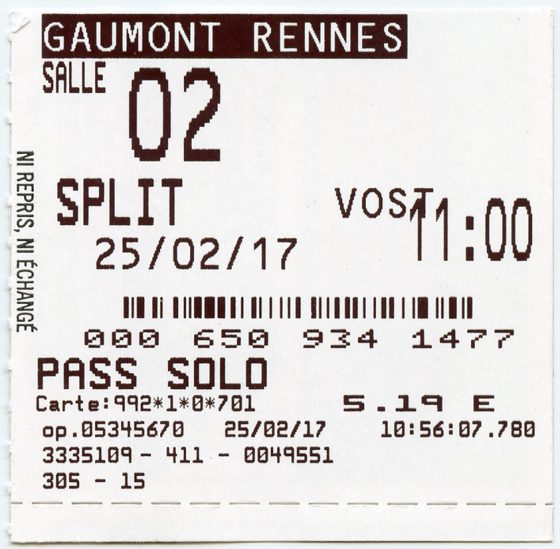Split

Here endeth
Currently, there is an ad running at the Gaumont Rennes, a French version of ‘Red Asphalt’. In this attempt to discourage dangerous driving, police officers describe coming to scenes of accidents, the horror they witness and having to tell the families what has happened. The very real emotion of the police officers makes it impossible to criticize it.
Fuck them and their fucking bullshit.

Besides the fact it’s three minutes long, here’s the thing. This kind of stuff just doesn’t work. The people who fuck up are still going to fuck up, and the assholes who fuck up driving on purpose, and I should know, are going to take this ad as an excuse to drive even more stupidly that particular day.
I’m not just being rhetorical, there’s a bunch of pretty consistent research on this. Ironically, in making the ad, they’re actually proving the point of why it doesn’t work. I’ll make an ad, the drunky French ad-exec says to monsieur le juge! That way I won’t have to do jail time!
The various bobos all agree, terrified that they might have to go to jail with the poor, and, like people who see the ad and don’t change their behavior, proceed not to actually check to see if these kind of lazy scare tactics work. Thus they self-satisfiedly go about spoiling the experience of millions of filmgoers (and millions of filmgoing experiences for one filmgoer), and make the road more dangerous.
Thanks ad-exec! I sure hope they made lots of movies about you, because you’re such a sympathetic character.
Ah, Collateral Beauty.
Anyway, I was clearly in the mood for Split, which I sense – strongly – will be the worst film of the year. Dear reader, it is important to remember, to be the worst film, you must be inept and evil, and Split has both types of this connerie in spades. It commits the only sin you can in horror, a genre that involves swearing, blood, barf and cutting people in half on camera: it’s not scary.
Not once.
Let’s talk about this not-scariness came about. This film is not unlike the extended remix of Mr. M. Night Shyamalan’s don’t-call-it-a-comeback-because-it-wasn’t-a-comeback-it-was-a-piece-of-shit The Visit. Characters have to behave stupidly in horror. Fine. But there is a threshold. The Visit had a scene of someone opening a door, seeing the lady with the knife and…entering the room and closing the door behind her.
Split extends this with three young girls who are, I’m sorry way larger than (the perfectly serviceable, but let’s face facts, he’s not a big guy) Mr. James McAvoy. Faced with either getting away, or…not I guess, they not.
This high level idiocy is throughout. In the opener, featured many times on my facebook feed, Mr. McAvoy enters a car and sprays girls with sleep juice. Now this is all I saw, as I remain, even with films such as this, a devout trailer avoider. I finally got to see the rest, when Ms. Anya Taylor-Joy (our outcast therefore she’s the lead), is given a choice to leave when her kidnapper hesitates (Huh. How about that. He’s stupid too). She, I guess taking her cue from the kidnapper, also hesitates, easily able to escape, and waits, patiently, to be sprayed.
Now we’ll get to the loathsome explanation for why she didn’t run at the end (see ‘evil’, above), but her reasons for not making the most obvious choice (oh, and saving the other two girls, by the way), puts one, unpleasantly, in a JJ Abrams kinda mood. What’s the surprise?, one asks, and as one does, here’s the thing: you can’t be scared, because you don’t know the basics, of the characters, of their relationships, of their motives, of who they are.
Once captured in scary lair, Ms. Taylor Joy proceeds to convince the other girls not to fight back (which is really a lesson we should be teaching young people while we’re telling them to drive safely and make better movies). One speculates: a ha! She must know Mr. McAvoy. He’s like, I don’t know, her father or a ghost or she’s one of the personalities or who cares! By not fighting back, she’s trying to find his secret, and compassion is what will wind up protecting them. Instead when the other girls are horribly murdered in the end –
– spoiler alert, if you would even entertain seeing this film, fuck you –
– one realizes that Ms. Taylor-Joy is merely a dangerous coward.
The lesson? Why, it's one we should be teaching all our children: make sure you're raped by your uncle!
Oh, but we’re not done.
When one realizes that the film is going to be depicting the mentally ill as homicidal, one is soon to realize: this is least offensive thing about it. And yeah, I’m counting the shitty filmmaking.
As I boringly toyed with the Rubik’s cube of permutations that we endure instead of stories, I just assumed that she knew something about Mr. McAvoy’s character, that she was her own personality ghost father or whathaveyou. Why else would she doom herself and the other characters?
It never occurred to me, not for second, that her not fighting back was a cheap character trait exploited from her horrible childhood. See, Ms. Taylor-Joy has been repeatedly raped by her uncle. That’s why she wouldn’t resist.
A…ha?
The throwaway aspect of this exploitative in the bad way reveal progresses as Mr. McAvoy, now in evil eating people personality, sees that she has scars. This means, unlike the others, she is worthy of being saved. The lesson? Why, it’s one we should be teaching all our children: make sure you’re raped by your uncle!
Maybe they should make a three minute film about it.
Passivity in the face of violence was the topic of my (failed, but nevertheless awesome) doctoral thesis, and about this topic, I know as much as anyone could. And fine, I’ll concede, this is real. In fact, I’ll up the tone here and tell you that it has a name: tonic immobility. Whether or not one is abused (and honestly, psychological trauma is not a factor in whether or not one freezes. Fighters can be former victims, just as freezers can be well-trained soldiers), this does happen. And it would be probably be an interesting topic for a film.
It is not is a topic for a lazy, inept genre film. I feel bad for using the words inept and lazy next to genre, and apologize for all the I can see now were in fact wonderfully well written Law & Order: SVUs out there.
Psychological weakness can be a topic for a genre film (I would say ‘good genre film’, but if it’s genre, it’s good, and if it’s not good, it not in the genre. Got it?) , as it was in Vertigo and, less successfully, Body Double, because the weakness was part of the con. This means two things. One, that the hero has a reason for being in the story, instead of every aspect being dependent on coincidence. Two, that the character can then fight back against their weakness as embodied in the villain. That’s genre.
Still not done. Not me, the film. The film isn’t done with me.
Multiple personalities are not, despite actors’ fervent desires to play them, great fodder for genre films. This is not unlike torture depicted onscreen, or The Writer’s Block film (technically, Writer Is Sad That His Girlfriend Left film), as the conflict is entirely internal, and thus up to the filmmaker. He could save them…but he doesn’t. He could kill them…and he does.
Not scary.

The French poster simply states: he has 19 distinct personalities. I think they knew that was all the film has to offer.
During these hours of no one deciding to do anything, we are forced to pass internal time as we wait for the big reveal. We are going to find out – very, very, very slowly – whether or not his last personality will actually turn him into The Beast. This Beast may have the power to transform his body into something supernatural. That’s a moderately interesting topic for a 1980s Cannon film. Technically a trailer for a Cannon film that you never saw, but totally tell people that you did.
Fine. I did actually see it.
When it is finally revealed that…the transformation doesn’t happen, it was, I thought, pretty boring. Didn’t really care. That is, until, it’s revealed that the transformation did happen. Huh, I thought. Maybe I didn’t care more about this way. Or I did. My indifference couldn’t decide if it existed. It’s kind of amazing, in an extremely dry and academic way, to wait an entire long film for one moment that doesn’t have any impact.
Oh, but we’re still not done.
See, Mr. Bruce Willis appears at the very end, the coda as it were. He is reprising his character in Unbreakable, making this godawful fly-attractor somehow part of the same universe of that excellent film. As we start to reevaluate our years ago faith in Mr. Shyamalan’s talent, Mr. Willis forces that film to go down a notch, which in turn makes this film go down a notch and so on. It’s the well-documented Tarantino spiral. How you feel after seeing Death Proof: were any of the films good, or, heaven forfend, was I w-w-wrong about them?
This isn’t actually worse than the other stuff, which is ethically repellent, but it comes at the end, and the cumulative effects makes it seem like it is. It certainly originates from the same mind.
It is very sad indeed, because I liked, loved, Unbreakable, the film according The Second Peter Hyams Rule, destroyed Mr. Shyamalan’s career. Mr. Willis’ inclusion makes the filmmaker come off like a middle aged man talking about his college years. That old vegan joke – ‘How do know if someone went to Harvard? They’ve already told you.’
The difference, here, is that we’re paying him to tell us about how great he used to be. This a kind of vacuum death whirlpool, that the inventor of the modern gotcha film, who inspired the next generation in the Lost Hydra, is now simply ripping off copies of his copies. Mr. Willis at the end is exactly the same reveal from 10 Cloverfield Lane, that a ha! it was within that particular film universe all along, even though it really wasn’t or couldn’t be and even if it was, so what, it wasn’t scary.
And that, dear reader, is how you prevent people from making terrible films. The trick is not minding that it doesn’t work.
The Take

-$22.98
The Lonely Comments Section

 [logo]
[logo]
